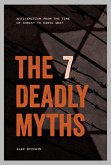As Adolf Hitler strategised his way to power, he knew that it was necessary to gain the support of theology and the Church. This study begins two hundred years earlier, however, looking at roots of theological anti-Semitism and how Jews and Judaism were constructed, positively and negatively, in the biblical interpretation of German Protestant theology. Following the two main streams of German theology, the salvation-historical and the Enlightenment-oriented traditions, it examines leading exegetes from the 1750s to the 1950s and explores how theology legitimises or delegitimises oppression of Jews, in part through still-prevailing paradigms. This is the first comprehensive analysis of its kind, and the result of the analysis of the interplay between biblical exegesis and attitudes to Jews and Judaism is a fascinating and often frightening portrait of theology as a servant of power.
Bitte wählen Sie Ihr Anliegen aus.
Rechnungen
Retourenschein anfordern
Bestellstatus
Storno






